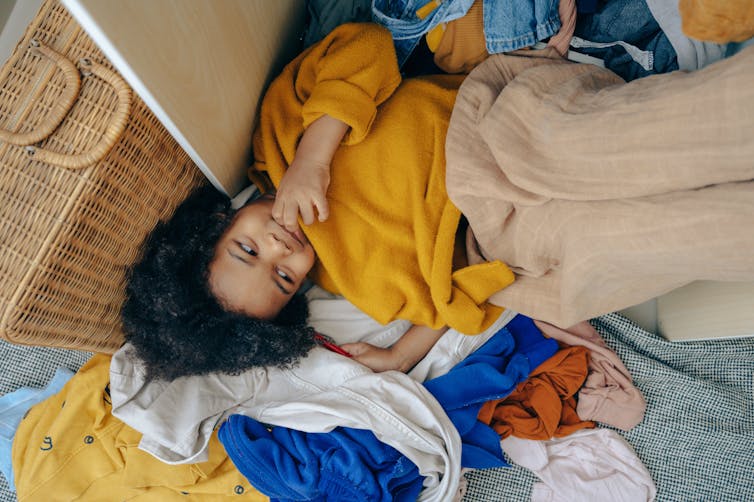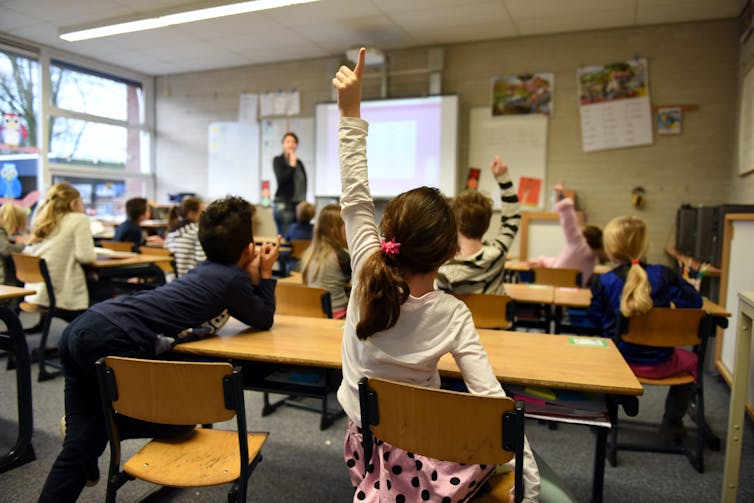Why are my kids good around other people and then badly behaved with me?

Parents may be familiar with this scenario: a child is well behaved at school and polite to their teachers but has a meltdown at home in the afternoon.
Or they say please and thank you at a friend’s house but are rude with their family. They follow the rules if they visit a neighbour but have to be constantly reminded about not slamming doors and raiding the pantry at home.
Why is this so? And is there anything you can do about it?
Children learn early their behaviour matters
Even well behaved children misbehave from time to time.

Ksenia Chernaya/Pexels, CC BY-SA
When young children get tired, such as after a play date or a long day at daycare or school, they can become irritable and disruptive. Children are also naturally curious and may misbehave sometimes just to see what happens.
However, some children seem to behave consistently worse at home than with other people. To understand this phenomenon, it’s necessary to understand why children behave the way they do.
From the very beginning, a child’s behaviour produces results or outcomes. For example, babies soon learn crying is a very effective way of signalling they are in distress. Parents quickly learn to change a wet nappy or feed their infant when they cry. A smile often results in an adult smiling back, cooing or cuddling the baby.
So children quickly realise their behaviour can be an effective way of controlling the actions of others.
The bad behaviour pay-off
Children’s behaviour, whether desirable or undesirable, is influenced by the consequences it produces.
Sometimes, the reactions of parents or siblings can accidentally reward misbehaviour, and children learn undesirable behaviour has a payoff.
For example, children may learn that when they don’t do as they’re told, they get extra attention from their parents. This attention may be reasoning, discussing, arguing, nagging or repeating instructions over and over. It may not be seen as a “reward” to adults, but children are getting more attention from mum or dad.
Children may also learn when they whine and complain for an electronic device they are more likely to get it.
Unfortunately, in this scenario, the child is rewarded for whining and the parent is rewarded for giving them the iPad because it stops a highly irritating noise (at least in the short term). As both the child and the parent are rewarded, this interaction is likely to occur again.

Ketum Subiyanto/Pexels, CC BY-SA
Why are kids better at school?
When children are with less familiar people, they do not know how others will respond or what behaviour will result in a payoff. In these circumstances it is common for there to be less undesirable behaviour, at least temporarily.
Children can also behave better at school than at home because teachers have very good systems in place. Children are kept busy with a variety of engaging activities, expectations of children’s behaviour are clear, and the payoff for desirable behaviour is reliable. Teachers are well practised at recognising and rewarding desirable behaviour through attention, praise and sometimes token reward systems.
Children also tend to imitate their peers’ behaviour, particularly if they see it gets results, such as attention from the teacher or access to prized activities.

Arthur Krijgsman/Pexels, CC BY-SA
How can parents help kids to behave better at home?
The good news is if children behave well in one setting, we know they are capable of doing the same at home.
Parents can value children’s need to relax at home while still expecting them to be polite and follow rules. By making some small changes, it’s usually possible to see much improved behaviour.
Here are some practical things parents can do:
- establish routines. Have a routine for when your child gets home from school or outings. This might include allowing your child to unwind and relax, giving them a healthy snack, and then setting them up with an engaging activity. Routines make it easier for everyone to transition from one setting to another. It is even better if the routine includes activities – such as colouring-in or a run around outside – that are calming or burn off energy.
- set simple house rules. Have a few simple rules that clearly communicate to your child how you expect them to behave. For example: “use an inside voice” or “keep the toys on the floor”.
- notice good behaviour. Let your child know when they have done the right thing. Do this by describing what you are pleased with (“you two are sharing the toy so nicely”). This will make it more likely the behaviour will occur again.
- spend small amounts of time with your child regularly. This is especially important when your child approaches you for help or attention. It shows you’re there for them and they do not need to become louder or act out to get your attention. Spending small amounts of time – as little as one or two minutes – often throughout the day is a powerful way of strengthening your relationship with your child and preventing problem behaviour.
- have realistic expectations. Change is easier if you focus on one or two goals at a time. Also, when striving to improve behaviour, expect occasional setbacks. No child (or parent) is perfect!

Trevor Mazzucchelli, Associate professor, Curtin University
This article is republished from The Conversation under a Creative Commons license. Read the original article.





















